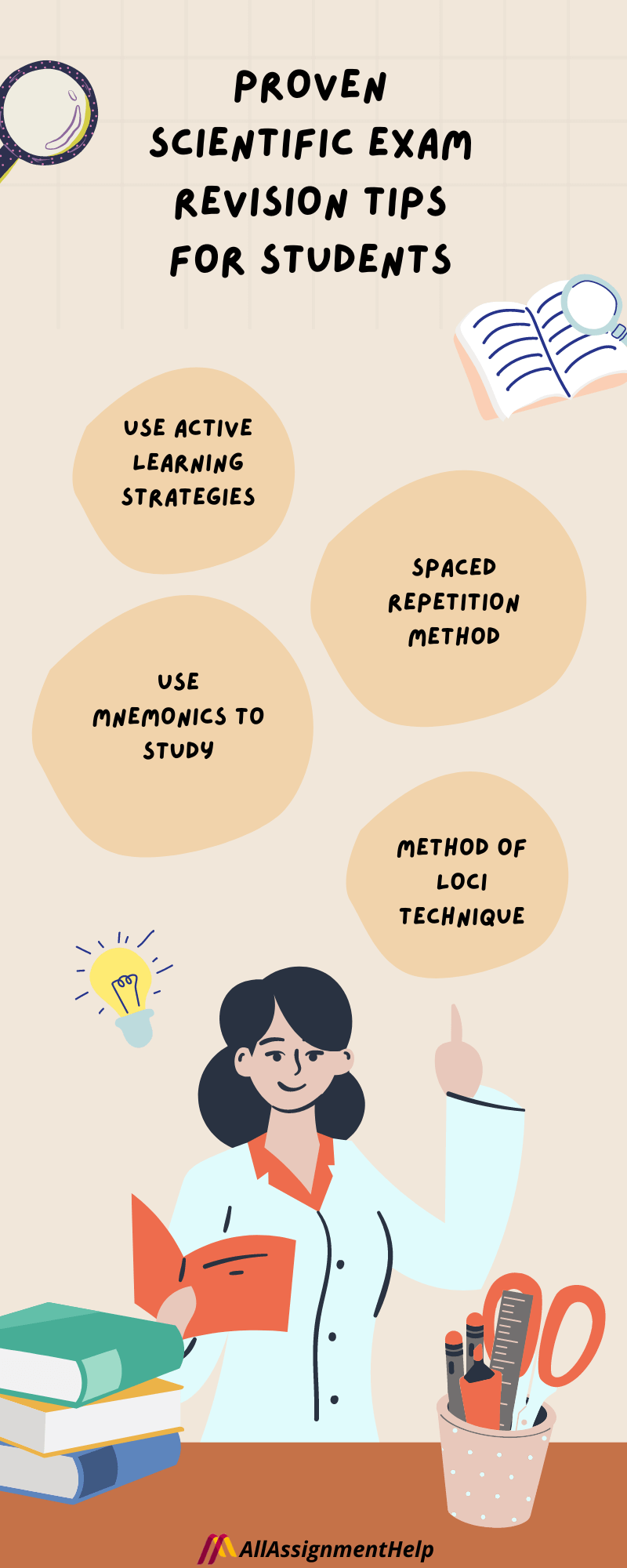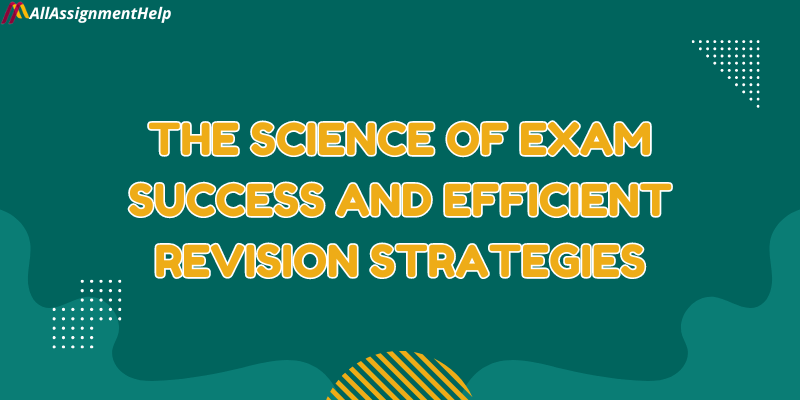Table of Contents
Exam success is mostly dependent on revision. Still, the majority of people differ in their revision processes and what works best for them. Students need to optimize their learning abilities to understand the science underlying successful exam revision strategies. Students can customize their study techniques to better suit the natural functions of their brains and realize the full potential of their professional activities by understanding the scientific foundations of successful revision. This blog of All Assignment Help explores the scientific foundations of effective exam revision, providing strategies and evidence-based tips to maximize expert performance and study effectiveness.
How Do Memory Processes Function?
Our minds are incredible. Sight, sound, smell, touch, and taste are among the senses that send information to our sensory memory when we are awake. After that, the data we focus on is stored in our short-term memory. For thirty seconds, your short-term memory can hold seven items. Thus, obtaining knowledge up to this point won’t be sufficient to help you ace an exam.
Proactively transferring material into your long-term memory is a necessary component of effective exam revision. It is one of the best study habits for exams. Your long-term memory is capable of storing an infinite quantity of data for a very long period of time.
You will have to access your long-term memory to recover things to respond to questions during an exam. However, there are times when you might not be able to recall the material just before sitting for the exam. This might affect your exam performance. Hence, you should keep a backup in such a situation. You can hire someone who is an expert in taking exams simply by typing on the Internet, can someone take my online exam for me? There are online exam experts available to do your exam perfectly.
Read Here: 10 Effective Exam Preparation Tips To Boost Your Performance
The Scientific Foundation of Productive Exam Revision
The foundations of psychology and cognitive science form the psychology of exam preparation. Studies have indicated that the process of revising has a major impact on how well we remember as well as utilize the information we have learned. They are as follows:
- Spaced revision: Spaced revision is one of the exam revision strategies for improving long-term retention in which you learn using regular intervals and gradually review information rather than memorizing it all at once.
- Active recall: This is the method used to improve long-term memory for information. Instead of just passively rereading, this method makes use of strategies to help remember the subject matter. Taking tests or making flashcards are two examples of active recall methods.
- Retrieval practice: It takes more than just reading and rereading those difficult topics for you to keep them in your long-term memory. You must put what you have learned to the test to practice recovery of information.
Making the brain work to prevent knowledge from being forgotten is the foundation of effective exam revision strategies. However, this requires you to actively engage with the content and make connections with it. Still, if you are unable to cope up the material for your exam preparation, you can get online assignment help from subject experts in your field to get additional assistance with exam preparation as well as revision.
Proven Scientific Exam Revision Tips for Students
Exams can be extremely stressful for certain individuals. In general, you are required to prove your understanding of the subject in a brief period while seated in a controlled environment. Even if certain exams are oral or open-book, you still need to be fully educated about the subject matter.
The following are some strategies for exam revision that have been scientifically proven to get the best results:

Use Active Learning Strategies
Active learning strategies will significantly enhance your understanding and recall of the subject matter. Examples of these strategies include creating your summary of the content, teaching someone else, and using flashcards. These strategies activate multiple regions of the brain, improving the efficiency and enjoyment of the learning process. Thus, try implementing a variety of methods for active learning to keep your revision sessions lively and engaging.
Spaced Repetition Method
As the name suggests, spaced repetition involves breaking up the learning and recall process across time rather than doing it all at once. For example, you might study a subject for one hour on the first day, thirty minutes in the next, and thirty minutes in the third, instead of spending two hours on it in a single day. The goal is to give yourself time to recover from learning sessions while maintaining your memory of the subject. Research indicates that the process of space learning has a positive impact on neurons’ ability to learn and remember new information.
Practice Previous Exam Papers
Practicing previous exam papers is one of the most important exam revision tips for students. It helps you become familiar with the format, question types, and time management of the exam. For example, if you are about to take a math exam online and you are not familiar with its pattern and type of question asked, you might end up scoring poor grades. Also, if you are underprepared for the math exam, you might find yourself searching for a place where you can pay someone to take my online math exam for me. Therefore, it is suggested to set aside time to finish practice exams in an exam-like setting so that you don’t have to rush to someone else to take your exams.
Use Mnemonics to Study
You have undoubtedly heard of mnemonics at some point. Indeed, we are positive that you already used one of its methods. The term “mnemonics” refers to several strategies, including splitting, acrostics, acronyms, memory palaces, peg word methods, and more. BODMAS is one type of acrostic. In contrast, an acronym is a word created by combining the first letters of other words to construct a phrase or list. You will already be under time pressure during exam season. So, another piece of exam study advice would be to make sure you choose a method that won’t take too long to execute.
Adaptive Learning and Neuroplasticity
The principle of neuroplasticity highlights how adaptable and flexible the brain is to new information. Adaptive learning tactics are incorporated into effective exam revision to leverage this principle. Also, studying with different techniques and resources activates multiple brain regions, leading to deeper connections and a higher chance of remembering the content. This diverse method of studying exceeds dullness; it scientifically stimulates different brain regions and forms deep connections, increasing the likelihood that information will be retained while reviewing for an exam.
Method of Loci Technique
The “Method of Loci,” also known as the “Memory Palace,” is a memory-boosting strategy that helps you remember important details by using sensory information from everyday objects like your front entrance, bedroom, and residence. Most importantly, you are already well familiar with this location and/or travel. Then, a little fact about the subject is connected to each “stop” in this visual tour, such as the items in your bedroom, the places you pass on your walk home, or the numbers on the clock. This technique is favored by both neuroscientists and world record memory holders due to the fact that memory and spatial location are processed by the same brain region.
Cognitive Load Theory
This theory stresses how crucial it is to control the mental strain that comes with learning. Effective exam revision includes breaking complicated ideas down into smaller, more manageable portions to reduce cognitive overload. This methodical technique improves understanding and speeds up the process of knowledge being stored in long-term memory. Using this science, improving understanding turns into a tactical advantage that smoothly helps in the encoding of knowledge into the deep recesses of long-term memory during the most important exam revision phase.
Also Read: Online Exam Fear: How to Stay Focused and Confident?
Some Recommendations from Experts for Exam Revision
Apart from the previously mentioned scientific exam revision tips and methods, we have some additional expert guidance that you should follow up on before your exam.
- Get enough rest the night before the exam day.
- Eat a light, nutrient-dense breakfast, and brain foods before the exam.
- Get everything ready the night before, such as your admission card and any other necessary items.
- Remain calm and focus on the good things in your life.
- Remain hydrated and sip lots of water.
- Attend study groups at the last minute.
- Eat three healthy meals a day to avoid compromising your health.
- Make a plan for your exam strategy in advance.
Taking care of oneself is crucial when revising. Your brain will have a tougher time processing and remembering information if you’re anxious and worn out. Not only are physical activities, a healthy diet, enough sleep, and fresh air beneficial for the body, but they also benefit the mind. Undoubtedly, try to stay away from stressing the night before an exam!
Final Thoughts!
These are the practical and scientific exam revision tips and strategies that might assist you in improving your exam results and ranking. Here’s something to think about: your exam preparation can make or break your career. Thus, you should understand the psychology of exam preparation and focus your studies completely. Also, if you need someone to take your online exam, you can contact us as we have experts on board to help you get the best credits in your exams. Also, you can get in touch with us if you need help with your online classes. You can just visit our website and type, is there someone who can do my online class for me? and we will find the best class helper to take your online classes on your behalf.
FAQs
| What is the 1 2 4 7 revision method? On day 1, read about a topic for the first time. On day 2, day 4, and day 7, make revisions. In this manner, a topic is revised three times following the initial reading, with a progressively larger interval between each revision. |
| How to clear your mind for revision? When studying, take brief, thoughtful breaks to help you decompress. Spend some time stretching, practicing deep breathing, or getting some fresh air outside. With these pauses, you can reset your mind, avoid burnout, and improve your learning process. |
| How to concentrate on revising for exams? Identify the areas of your work that require improvement. Make a list and then develop a revision schedule to help you remember which subjects to revise on which day. Gather all of your notes, organize your study area, make any flashcards, and download any necessary applications so that you can get started on day two. |
